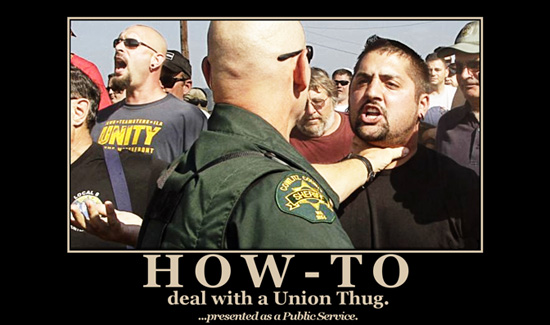What’s in a name? Defeat
Well the forces of labor dodged a major bullet on Monday when the Supreme Court decided that busting unions and eliminating freedom of religion on the same day was a bit much. But the union busters are already working on the next closed shop challenge and union-hater Samuel Alito kindly left the door open for them to come back and finish the job.
This labor stuff is complicated. It’s hard to understand without a degree in economics or at least a working knowledge of investment scams in the age of casino capitalism. That’s why keeping attorneys on retainer is such a big expense for unions.
If you got a negative feeling when you read the last word of the previous sentence you’re not alone. People really hate the word “union.” Actually it depends on the application. “A more perfect union,” connotes positive associations because it’s in the preamble to the U.S. Constitution.
“Labor union,” on the other hand gets lots of blood boiling as soon as people hear it. “Union thugs!” “Big Labor!” “I don’t get overtime – why should those greedy union members?!”
It’s for this reason that you rarely see the word union used in the title of organizations that represent the collective interests of groups of law enforcement officers. And the associations will tell you loud and clear that they are not “unions.”
It’s not uncommon for a police association president to write an op/ed in the local paper saying that the “association” is not in any way a “union.”
We won’t get into parsing words here and wasting time with the definitions of the words union and association. But it’s worth thinking about.
Any good political strategist, marketing expert or linguist will tell you that winning an argument in public debate has very little to do with what or who’s right and wrong. It doesn’t matter if “the people are on your side,” or not. What matters is how effectively you use language to frame the issue. “Union” is what political consultants call a “frame.” It’s a loaded term that carries huge emotional weight. That’s why everything you read about the Harris case will focus on “unions.”
Now it makes sense that police officers, a very socially and politically conservative group, would not want to call their union a union. Some officers will have more in common culturally speaking with the enemies of unions than they do with the folks at SEIU, AFSCME or the AFL-CIO.
And that’s just a massive ace in the hole for the people that want to get their hands on your members’ money.
Winning hearts and minds is a hell of a lot easier when you’re on offense passionately advocating for the rights of not just cops – but all workers. But when people are too scared to even be associated with a “union,” and go out of their way to point out that the union is not a union but an “association” you’ve basically done a lot of legwork for the very people trying to screw you.
Think about it this way. Guys like Morning Joe Scarborough are always bragging about their A+ rating from the American Conservative Union.
Those guys are proud to be members of that union. And they for some reason have no compunction whatsoever about using and being associated with the term “union.”
So why is a millionaire country club Republican like Joe Scarborough proud of his union bona fides while so many police union leaders go on the defensive as soon as the U-word is uttered?
It’s worth thinking about. Because when you control the terms and language of a debate, you generally control the outcome as well. Or maybe if we just call unions “associations” all the guys trying to get their manicured hands on your money will just go away.















